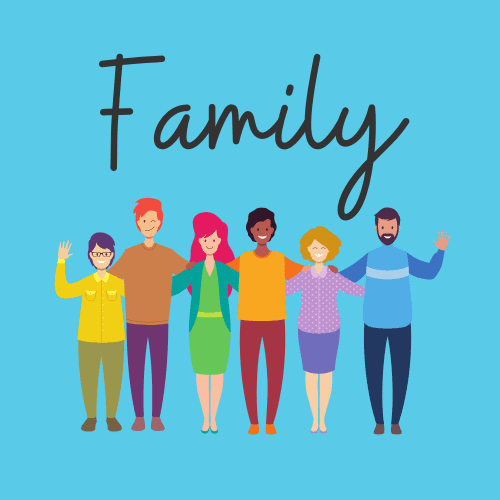Family
Wednesday January 26, 2022

I know that if you are or have ever been a caregiver, you know that caring for a loved one with dementia can be very hard. It is so important to know who is in your corner. I encourage all caregivers to really think this through. You will not be able to do this journey alone.
Who is going to be there when you need help? Who can you trust? Who will rise to the occasion when things are not going well? Who can you call when you need to vent or hear words of encouragement?
We all have families. We have our birth family. Some of us have families that we have married into. Some of us have great relationships with our family, while others have fractured relationships. Some of us live near our families while others live far away. One thing I know is that family is not always about blood relations.
In the book “Loving Someone Who Has Dementia” by Pauline Boss, Ph.D., Boss suggests that caregivers spend time choosing their psychological family. The psychological family is “created in your heart and mind. It can be your family of origin, but it can also be intentionally chosen… It’s the people you choose to have with you at your special times, like holidays and celebrations… Your psychological family could be made up of friends, neighbors, a book group, a spiritual congregation – or even other caregivers who understand best what it is you do.” (page 71).
You need close relationships. You need people that you can talk with and human connection. You may find this connection with family or friends who are far away. You can keep that connection through text, email, phone or video calls.
You can find connection with your neighbor who pops over for coffee regularly and who doesn’t care if the house is dirty or that you are wearing pajamas. You might connect with a friend from church who checks in regularly. Or maybe your daughter is a great support to you.
Or maybe you are caring for a parent and your spouse helps you care for your parent as if it were their own parent. Your caregiving family can include your blood relatives, but it doesn’t have to.
I live 400 miles away from my parents and siblings. When there is something that happens and I need help, the people I call are friends who live near enough to help. They are “framily” – friends that have become family. They are chosen family. I still love my biological family, but they aren’t near enough to help me with the day-to-day. Instead, my close “framily” will help whenever needed.
Families don’t always get along. Heck, people don’t always get along. People in your family may have lots of opinions about how you should be caregiving. They may tell you the things you should be doing or should have done differently. They may share unsolicited opinions. This list goes on. It can be frustrating to hear advice from family who don’t understand what you are dealing with on a daily basis.
There are also family members who choose not to be involved for whatever reason. They aren’t there for the daily stuff but may still express their opinions.
In her book, Dr. Boss continues: “When a family member has dementia, there’s no time to coddle the slackers. You need to know who has your back, and if biological family members are unwilling or too far away, seek support elsewhere. What caregivers need is someone – or several people – who can be unconditionally supportive. Like a good sister or a good brother” (page 79).
So here is a worthwhile homework assignment: think about your caregiving family. Who can help you in a crisis? Who will understand your circumstances and empathize with you? Who will be your ray of sunshine on a cloudy day? Who do you want to be there in the good times and the bad? A who can you let go of?
As Dr. Boss says in her book, “We all need someone like family to be there for us – someone who can play the role when real family members cannot – when a parent is ill, when a sibling is far away, when sons and daughters have their own children to care for. To manage the work of caregiving, seek others who can fill the roles when your own family members cannot. Your own health depends on it” (page 90).




